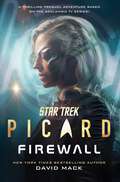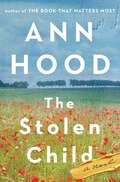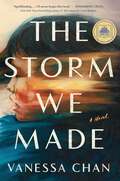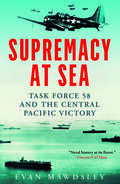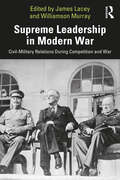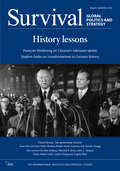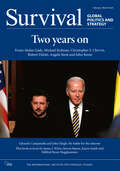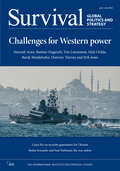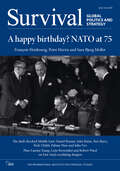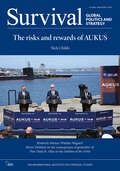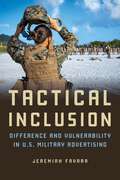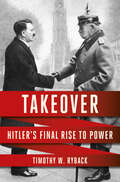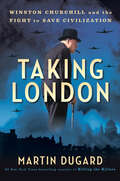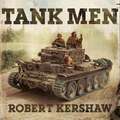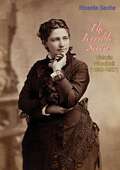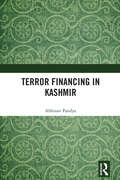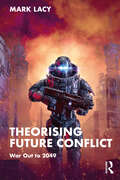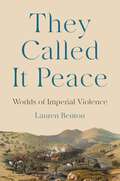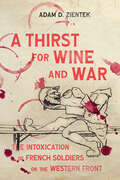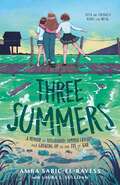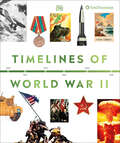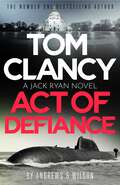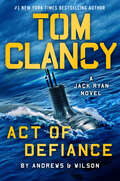- Table View
- List View
Star Trek: Picard: Firewall (Star Trek: Picard)
by David MackA thrilling prequel adventure based on the acclaimed TV series Star Trek: Picard!Two years after the USS Voyager&’s return from the Delta Quadrant, Seven of Nine finds herself rejected for a position in Starfleet…and instead finds a new home with the interstellar rogue law enforcement corps known as the Fenris Rangers. The Rangers seem like an ideal fit for Seven—but to embrace this new destiny, she must leave behind all she&’s ever known, and risk losing the most important thing in her life: her friendship with Admiral Kathryn Janeway.
The Stolen Child: A Novel
by Ann HoodAn unlikely duo ventures through France and Italy to solve the mystery of a child’s fate in this moving, page-turning novel from “a gifted storyteller” (People). For decades, Nick Burns has been haunted by a decision he made as a young soldier in World War I, when a French artist he’d befriended thrust both her paintings and her baby into his hands—and disappeared. In 1974, with only months left to live, Nick enlists Jenny, a college dropout desperate for adventure, to help him unravel the mystery. The journey leads them from Paris galleries and provincial towns to a surprising place: the Museum of Tears, the life’s work of a lonely Italian craftsman. Determined to find the baby and the artist, hopeless romantic Jenny and curmudgeonly Nick must reckon with regret, betrayal, and the lives they’ve left behind. With characteristic warmth and verve, Ann Hood captures a world of possibility and romance through the eyes of a young woman learning to claim her place in it. The Stolen Child is an engaging, timeless novel of secrets, love lost and found, and the nature of forgiveness.
The Storm We Made: A Novel
by Vanessa ChanNATIONAL BESTSELLER A GOOD MORNING AMERICA BOOK CLUB PICK In this spellbinding novel, an ordinary housewife becomes an unlikely spy—and her dark secrets will test even the most unbreakable ties.Malaya, 1945. Cecily Alcantara&’s family is in terrible danger: her fifteen-year-old son, Abel, has disappeared, and her youngest daughter, Jasmin, is confined in a basement to prevent being pressed into service at the comfort stations. Her eldest daughter Jujube, who works at a tea house frequented by drunk Japanese soldiers, becomes angrier by the day. Cecily knows two things: that this is all her fault; and that her family must never learn the truth. A decade prior, Cecily had been desperate to be more than a housewife to a low-level bureaucrat in British-colonized Malaya. A chance meeting with the charismatic General Fujiwara lured her into a life of espionage, pursuing dreams of an &“Asia for Asians.&” Instead, Cecily helped usher in an even more brutal occupation by the Japanese. Ten years later as the war reaches its apex, her actions have caught up with her. Now her family is on the brink of destruction—and she will do anything to save them. Spanning years of pain and triumph, told from the perspectives of four unforgettable characters, The Storm We Made is a dazzling saga about the horrors of war; the fraught relationships between the colonized and their oppressors, and the ambiguity of right and wrong when survival is at stake.
Stuffed Saddlebags: The Life of Martin Kundig, Priest 1805-1879
by Peter Leo JohnsonStuffed Saddlebags: The Life of Martin Kundig, Priest 1805-1879 is a biographical book written by Peter Leo Johnson. The book is a detailed account of the life of Martin Kundig, a Swiss Catholic priest who lived from 1805 to 1879. Kundig was a prominent figure in the Catholic Church and played a significant role in the religious and social history of Switzerland. The book provides a comprehensive overview of Kundig's life, from his childhood in Switzerland to his religious training and eventual ordination as a priest. The author delves into Kundig's experiences as a missionary in the United States and his work in establishing Catholic parishes and schools in the American Midwest. The book also explores Kundig's involvement in the political and social issues of his time, including his support for the abolition of slavery and his advocacy for the rights of immigrants. The author provides a detailed analysis of Kundig's writings and sermons, which reflect his commitment to social justice and his belief in the importance of education. Overall, Stuffed Saddlebags is a fascinating and insightful biography of a remarkable individual who played a significant role in the history of the Catholic Church and the United States. The book is well-researched and provides a rich and detailed portrait of Kundig's life, beliefs, and achievements. It is an excellent read for anyone interested in the history of the Catholic Church, American social history, or the life of a remarkable individual.-Print ed.
Supremacy at Sea: Task Force 58 and the Central Pacific Victory
by Evan MawdsleyThe gripping account of the U.S. Navy&’s fast carrier force—and how its Central Pacific campaign in 1944 marked the achievement of American naval supremacy Task Force 58 was World War II&’s most powerful battle fleet. Made up in mid-1944 of sixteen aircraft carriers, over a thousand combat aircraft, and an armada of escorts, it was vital to victory over Japan. In this compelling account, Evan Mawdsley charts the 3,500-mile dash of the &“Big Blue Fleet&” across the Central Pacific in the first six months of 1944, overwhelming enemy opposition and transforming the nature of naval warfare. The Battle of the Philippine Sea in June 1944 crushed the enemy&’s naval air force and secured war-winning air bases in the Mariana Islands. Mawdsley examines the elements of the rapidly assembled force—ships, planes, and 100,000 officers and men—as well as the advanced bases and fleet train that provided such astounding mobility. Task Force 58&’s campaign marked the achievement of naval supremacy by the United States, a status it maintains to this day.
Supreme Leadership in Modern War: Civil-Military Relations During Competition and War (Cass Military Studies)
by James Lacey Williamson MurrayThis edited volume focuses on civil-military relations before and during great power conflicts, and comprises historical case studies of modern supreme leadership. It aims to provide a guide for the future by shining a light on what worked and what failed in the civil-military relationships that steered great powers during the last era of rapid global change. While future civil-military relationships will have to adapt to the current global environment, the past remains, as always, a prelude. Thus, crucial concepts that underpin all such relationships are eternal and are waiting to be drawn out by historians trained to examine and present them to those who can put them to immediate good use. This volume demonstrates the relevance of history in every chapter, as readers will see parallels to today’s problems throughout every case study. The world is entering an age of great challenges, many of which require nations – particularly the most powerful – to establish civil-military relationships capable of navigating dangerous currents without a repeat of the calamities reminiscent of the last century. Each chapter focuses on a particular civil-military relationship as it developed before and during a great war. The editors have gathered leading experts on each of these periods to produce a concise but thorough essay on each relationship's intricacies. This book will be of much interest to students of military and strategic studies, military history and international relations, as well as professional miliary colleges and policymakers.
Survival: August 2023
by The International Institute for Strategic StudiesSurvival, the IISS’s bimonthly journal, challenges conventional wisdom and brings fresh, often controversial, perspectives on strategic issues of the moment. In this issue: François Heisbourg assesses that Ukraine might have to accept the de facto division of the country to secure a fast track into NATO Daniel Byman writes that state ties to terrorist groups are likely to feature in the western alliance’s long-term confrontation with Russia and in its rivalry with China Juan Pablo Medina Bickel and Irene Mia assess that global climate mitigation and the energy transition could reinforce South America’s geopolitical clout From the Survival archives, the late David P. Calleo predicted in 1999 that a successful euro would enhance the EU’s diplomatic and military capabilities, while the late James Dobbins considered in 2012 how the US could prevent a war with China Dana H. Allin and John L. Harper reflect on long-time Survival contributing editor David P. Calleo’s legacy And nine more thought-provoking pieces, as well as our regular Book Reviews and Noteworthy column. Editor: Dr Dana Allin Managing Editor: Jonathan Stevenson Associate Editor: Carolyn West
Survival: February-March 2024
Survival, the IISS’s bimonthly journal, challenges conventional wisdom and brings fresh, often controversial, perspectives on strategic issues of the moment.In this issue: Franz-Stefan Gady and Michael Kofman highlight the pitfalls of grafting a Western manoeuvre-oriented approach to war onto the Russia–Ukraine conflict Irene Mia examines the chasm between Javier Milei’s dramatic rhetoric and the domestic and international obstacles he faces to changing Argentina’s foreign and economic policies Edoardo Campanella and John Haigh outline the necessity of meaningful dialogue between the West and China to prevent the internet’s fragmentation John Raine assesses the geopolitical trends that the Gaza war has set in motion and the issues they create for Ukraine’s defence against Russia And seven more thought-provoking pieces, as well as our regular Book Reviews and Noteworthy column. Editor: Dr Dana AllinManaging Editor: Jonathan StevensonAssociate Editor: Carolyn WestEditorial Assistant: Conor Hodges
Survival: June - July 2023
by The International Institute for Strategic StudiesSurvival, the IISS’s bimonthly journal, challenges conventional wisdom and brings fresh, often controversial, perspectives on strategic issues of the moment. In this issue Hannah Aries, Bastian Giegerich and Tim Lawrenson assess that Europe’s defence industry will struggle to meet increased production needs In 2007, the late Ronald Steel judged that while the Iraq War had weakened the United States, it would not profoundly affect US foreign policy (from the archive) Dana H. Allin reflects on Ronald Steel’s legacy and prospects for the ‘extended American Century’ Liana Fix argues that the West should formulate security guarantees for Ukraine in parallel with its counter-offensive Daniel Sobelman assesses that the Yemen-based Houthi rebel movement is emulating Hizbullah And seven more thought-provoking pieces, as well as our regular Book Reviews and Noteworthy column. Editor: Dr Dana Allin Managing Editor: Jonathan Stevenson Associate Editor: Carolyn West Editorial Assistant: Charlie Zawadzki
Survival: June-July 2024
by The International Institute for Strategic Studies (IISS)Survival, the IISS’s bimonthly journal, challenges conventional wisdom and brings fresh, often controversial, perspectives on strategic issues of the moment.In this issue: François Heisbourg considers how Europeans might prepare for a disrupted US security commitment if Donald Trump becomes president again – free to read Lanxin Xiang warns that the Biden administration’s democracy-versus-autocracy framework increases the risk of conflict between the United States and China Daniel Byman argues that the Gaza war will leave both Israel and Hamas worse off – free to read Hanna Notte assesses the impact of the Russia–Ukraine war on multilateral nuclear forums and on the broader nuclear order And ten more thought-provoking pieces, as well as our regular Book Reviews and Noteworthy column. Editor: Dr Dana AllinManaging Editor: Jonathan StevensonAssociate Editor: Carolyn WestEditorial Assistant: Conor Hodges
Survival: October – November 2023
Survival, the IISS’s bimonthly journal, challenges conventional wisdom and brings fresh, often controversial, perspectives on strategic issues of the moment. In this issue: Nick Childs assesses the ambitions and perils of the AUKUS partnership for Australia, the United Kingdom and the United States Kimberly Marten explores how the demise of its key figures will affect future operations of the Wagner Group and similar Russian paramilitaries Steven Feldstein investigates the uses and risks of generative-AI systems From the Survival archives, the late Pierre Hassner interpreted Russia’s August 2008 attack on Georgia as signalling the emergence of a new cold war with the West Dana H. Allin reflects on the European vision advanced by members of a rapidly disappearing generation of scholars who had lived through war and sought to preserve and extend peace And eight more thought-provoking pieces, as well as our regular Book Reviews and Noteworthy column. Editor: Dr Dana Allin Managing Editor: Jonathan Stevenson Associate Editor: Carolyn West Editorial Assistant: Conor Hodges
Suspicious Activity: A Legal Thriller
by Mike Papantonio Christopher PaulosSuspicious Activity is an epic drama of intrigue, suspense, thrills, and legal combat—torn out of today&’s headlines. &“The purpose of the lawsuit is to fully expose the bank&’s willing support to groups that are killing Americans—and others—overseas.&” This announcement by attorney Nicholas &“Deke&” Deketomis sets up the gladiatorial arena between Big Banking and a team of well-meaning activist lawyers. The Iraq and Afghanistan Wars introduced the concept of IEDs (Improvised Explosive Devices) and EFPs (Explosively Formed Penetrators) that seriously maim or kill. It appears that these bombs are still being made and utilized by terrorists overseas. Who is funding them? Could it possibly be a large global bank with a major branch in New York? Is a reverse money laundering scheme in place that allows money transactions to bypass Department of Justice sanctions? Deke and his colleagues—co-counsel Michael Carey and investigators Carol Morris and Jake Rutledge—set out to uncover the deceit and bring the white collar criminals to justice. With the help of Michael&’s friend and war veteran, Joel Hartbeck—who first blows the whistle against the bank—the Deketomis team quickly discovers that they may have tackled more than they bargained for. A dangerous right wing paramilitary group might be involved in protecting the bank&’s interests, and Hartbeck soon goes missing. As Deke&’s lawsuit progresses, the sudden appearance of IEDs and EFPs on US highways cause death and destruction. Who is behind this evil?Readers who devour the financial-action-legal thrillers of Joseph Finder, Stephen Frey, and James Grippando will enjoy Suspicious Activity.
Tactical Inclusion: Difference and Vulnerability in U.S. Military Advertising (Feminist Media Studies)
by Jeremiah FavaraThe revolution in military recruitment advertising to people of color and women played an essential role in making the US military one of the most diverse institutions in the United States. Starting at the dawn of the all-volunteer era, Jeremiah Favara illuminates the challenges at the heart of military inclusion by analyzing recruitment ads published in three commercial magazines: Sports Illustrated, Cosmopolitan, and Ebony. Favara draws on Black feminism, critical race theory, and queer of color critique to reveal how the military and advertisers affected change by deploying a set of strategies and practices called tactical inclusion. As Favara shows, tactical inclusion used representations of servicemembers in the new military to connect with people susceptible to recruiting efforts and rendered these new audiences vulnerable to, valuable to, and subject to state violence. Compelling and eye-opening, Tactical Inclusion combines original analysis with personal experience to chart advertising’s role in building the all-volunteer military.
Takeover: Hitler's Final Rise to Power
by Timothy W. RybackFrom the internationally acclaimed author of Hitler&’s Private Library, a dramatic recounting of the six critical months before Adolf Hitler seized power, when the Nazi leader teetered between triumph and ruinIn the summer of 1932, the Weimar Republic was on the verge of collapse. One in three Germans was unemployed. Violence was rampant. Hitler&’s National Socialists surged at the polls. Paul von Hindenburg, an aging war hero and avowed monarchist, was a reluctant president bound by oath to uphold the constitution. The November elections offered Hitler the prospect of a Reichstag majority and the path to political power. But instead, the Nazis lost two million votes. As membership hemorrhaged and financial backers withdrew, the Nazi Party threatened to fracture. Hitler talked of suicide. The New York Times declared he was finished. Yet somehow, in a few brief weeks, he was chancellor of Germany. In facinating detail and with previously un-accessed archival materials, Timothy W. Ryback tells the remarkable story of Hitler&’s dismantling of democracy through democratic process. He provides fresh perspective and insights into Hitler&’s personal and professional lives in these months, in all their complexity and uncertainty—backroom deals, unlikely alliances, stunning betrayals, an ill-timed tax audit, and a fateful weekend that changed our world forever. Above all, Ryback details why a wearied Hindenburg, who disdained the &“Bohemian corporal,&” ultimately decided to appoint Hitler chancellor in January 1933. Within weeks, Germany was no longer a democracy.
Taking London: Winston Churchill and the Fight to Save Civilization
by Martin DugardFrom Martin Dugard, #1 New York Times bestselling coauthor of Bill O'Reilly's Killing series—with more than 12 million copies sold—comes a soaring account of England's desperate fight to fend off German invasion. Great Britain, summer 1940. The Battle of France is over. The Battle of Britain is about to begin. Adolf Hitler&’s powerful armies control Europe. England stands alone against this juggernaut, the whole world knowing it is only a matter of time before Nazi Germany unleashes its military might on the island nation. And in London, a new prime minister named Winston Churchill is determined to defeat the Nazi menace, no matter the costs. Luckily for Churchill, one quirky Englishman has seen the future. Air Vice-Marshall Hugh Dowding is head of the Royal Air Force Fighter Command. He has spent years preparing his nation's aerial defenses, utilizing the new technology of radar, training hundreds of hand-picked young pilots, and overseeing the design and purchase of the world's most up-to-date fighter aircraft. In time, the names "Spitfire" and "Hurricane" will become iconic, these airplanes synonymous with a David versus Goliath struggle between the RAF and German Luftwaffe. For the first time in history, the battlefield will not be on land or in water but entirely contested in the skies above. Nazi victory depends upon their overwhelming air power, and the fate of not just the British people but all of Western Civilization hinges on a small group of elite pilots stopping this onslaught—a band of brothers who will go down in history as the Few. Taking London puts the reader inside the action, bringing to life the personal sagas of Churchill, Dowding, and legendary fighter pilots like Peter Townsend, Geoffrey Wellum, Richard Hillary, and American Billy Fiske, all set against the defiant backdrop of wartime London. Told in fast-paced, you-are-there fashion, this third book in the epic Taking series is an indelible portrait of the moment the tide of WWII was turned, and the incredible heroes who made it happen.
Tank Men (Hachette Military Collection)
by Robert KershawThe First World War saw the birth of an extraordinary fighting machine that has held an enduring fascination for over a century: the tank. In TANK MEN, ex-soldier and military historian Robert Kershaw brings to life the grime, the grease and the fury of a tank battle through the voices of ordinary men and women who lived and fought in those fearsome machines. Drawing on vivid personal testimony from the crucial battles of the First and Second World Wars, this is military history at its very best.
The Terrible Siren: Victoria Woodhull (1838-1927)
by Emanie SachsAs Publishers Weekly noted, “No heroine of any romance ever had a more adventurous career than this unvictorian Victoria.”In Victoria Woodhull’s prime during the mid to late 1800s, women were not allowed to vote, were not encouraged to run a business, and certainly did not speak of free love, much less get divorced. Women endured other ridiculous conventions, like not being seen outside a home after dark without an escort. Restaurants refused to serve single women after 6pm.Victoria Woodhull smashed all these conventions and many more. She married for the first time while only 15 years old. She was married at least 3 times, with 2 divorces.Victoria held seances for Cornelius Vanderbilt to give him tips. With his mentorship, she, along with Tennessee, her equally beautiful sister, opened their own stock brokerage firm and were the first female brokers on Wall Street. One reviewer said it was a time “when a woman in business was as great a novelty as an elephant in a balloon.”The sisters ran a weekly newspaper in New York that ardently advocated for free love. Anthony Comstock sent them to jail for the contents of that paper.Victoria was a skillful orator who pushed for women’s equality, especially suffrage. One reviewer stated, “Audiences came to denounce her and stayed to acclaim her.”She was the first woman to be nominated for President of the United States by a political party. She ran in 3 different elections.She was the first woman to receive an official hearing before a congressional committee, when she presented a memorial about woman suffrage.Victoria unapologetically sought the spotlight and practiced what she preached despite notoriety and persecution.
Terror Financing in Kashmir
by Abhinav PandyaThis book analyses the layered and complex web of terror financing in Kashmir. It examines the role of multiple actors — including formal and informal, state and non-state, profit and non-profit, and local and international — to delineate the various strands of an intricate financial system. It shows how, over time, these sophisticated networks have largely remained elusive to Indian counter-terrorism agencies and the need for a specialised and focused effort to understand it. Drawing on interviews with confidential sources within terror networks, as well as inputs and intel from security agencies on the ground, the author lays the groundwork for a robust counter-terrorism strategy in Kashmir. This book will be a must read for professionals and researchers in security studies, military and strategic studies, politics and international relations, and South Asian studies.
Theorising Future Conflict: War Out to 2049 (Routledge Studies in Conflict, Security and Technology)
by Mark LacyThis book explores the changing tactics, technologies and terrains of twenty-first century war. It argues that the world in 2049 is unlikely to look like the climate change/artificial intelligence (AI) dystopia depicted in Blade Runner 2049, but nor will it be a world where conflict and war has been transformed by a ‘civilising process’ that eradicates violence and conflict from the human condition. 2049 is also the year that the US Department of Defense has suggested China will become a world-shaping military power. All states will be engaged in ‘arms races’ across a variety of new tools and technologies—from drones, robotics, AI and quantum computing—that will transform politics, economy, society and war. Drawing on thinkers such as Zygmunt Bauman and Paul Virilio, the book suggests that future war will be shaped by three broad tendencies that include a broad range of tactics, technologies and trends; the impure, the granular and the machinic. Through discussions of cybersecurity, urban war, robotics, AI, climate change, science fiction and new strategic concepts, it examines how these tendencies might evolve in the different geopolitical futures and types of war ahead of us. The book provides a thought-provoking and distinctive framework through which to think about the changing character of war. It concludes that for all the novel and dangerous challenges ahead, the futuristic possibilities of warfare will likely continue to be shaped by problems familiar to students of international relations and the history of war—albeit problems that will play out in geopolitical and technological contexts that we have never encountered before. This book will be of much interest to students of critical war studies, security studies, science and technology studies, and International Relations in general.
They Called It Peace: Worlds of Imperial Violence
by Lauren BentonA sweeping account of how small wars shaped global order in the age of empiresImperial conquest and colonization depended on pervasive raiding, slaving, and plunder. European empires amassed global power by asserting a right to use unilateral force at their discretion. They Called It Peace is a panoramic history of how these routines of violence remapped the contours of empire and reordered the world from the fifteenth to the twentieth centuries.In an account spanning from Asia to the Americas, Lauren Benton shows how imperial violence redefined the very nature of war and peace. Instead of preparing lasting peace, fragile truces ensured an easy return to war. Serial conflicts and armed interventions projected a de facto state of perpetual war across the globe. Benton describes how seemingly limited war sparked atrocities, from sudden massacres to long campaigns of dispossession and extermination. She brings vividly to life a world in which warmongers portrayed themselves as peacemakers and Europeans imagined &“small&” violence as essential to imperial rule and global order.Holding vital lessons for us today, They Called It Peace reveals how the imperial violence of the past has made perpetual war and the threat of atrocity endemic features of the international order.
A Thirst for Wine and War: The Intoxication of French Soldiers on the Western Front (Intoxicating Histories)
by Adam D. ZientekBeginning in the fall of 1914, every French soldier on the Western Front received a daily ration of wine from the army. At first it was a modest quarter litre, but by 1917 it had increased to the equivalent of a full bottle each day. The wine ration was intended to sustain morale in the trenches, making the men more willing to endure suffering and boredom. The army also supplied soldiers with doses of distilled alcohol just before attacks to increase their ferocity and fearlessness. This strategic distribution of alcohol was a defining feature of French soldiers’ experiences of the war and amounted to an experimental policy of intoxicating soldiers for military ends.A Thirst for Wine and War explores the French army’s emotional and behavioural conditioning of soldiers through the distribution of a mind-altering drug that was later hailed as one of the army’s “fathers of victory.” The daily wine ration arose from an unexpected set of factors including the demoralization of trench warfare, the wine industry’s fear of losing its main consumers, and medical consensus about the benefits of wine drinking. The army’s related practice of distributing distilled alcohol to embolden soldiers was a double-edged sword, as the men might become unruly. The army implemented regulations and surveillance networks to curb men’s drinking behind the lines, in an attempt to ensure they only drank when it was useful to the war effort. When morale collapsed in spring 1917, the army lost control of this precarious system as drunken soldiers mutinied in the thousands. Discipline was restored only when the army regained command of soldiers’ alcohol consumption.Drawing on a range of archives, personal narratives, and trench journals, A Thirst for Wine and War shows how the French army’s intoxication of its soldiers constituted a unique exercise of biopower deployed on a mass scale.
Three Summers: A Memoir of Sisterhood, Summer Crushes, and Growing Up on the Eve of War
by Amra Sabic-El-Rayess Laura L. SullivanAn epic middle-grade memoir about sisterhood and coming-of-age in the three years leading up to the Bosnian Genocide. Three Summers is the story of five young cousins who grow closer than sisters as ethnic tensions escalate over three summers in 1980s Bosnia. They navigate the joys and pitfalls of adolescence on their family’s little island in the middle of the Una River. When finally confronted with the harsh truths of the adult world around them, their bond gives them the resilience to discover and hold fast to their true selves.Written with incredible warmth and tenderness, Amra Sabic-El-Rayess takes readers on a journey that will break their hearts and put them back together again.
Timelines of World War II (DK Timelines)
by DKDiscover the stories behind the conflict that shaped the modern world in this richly illustrated guide to the Second World War.From the rise of fascism in Italy and Germany in the 1920s to the attack on Pearl Harbor, and the Battle of Stalingrad to the bombing of Hiroshima, through to the founding of the State of Israel in 1948, Timelines of World War II brings the key milestones of the conflict to life, explaining each of them through contemporary photos, documents, maps, and artifacts.This accessible and wide-ranging overview of WWII explores the key events and turning points of the conflict from around the world, from the Normandy Beaches to the jungles of Burma, and offers insights into the experiences of leaders, soldiers, and civilians involved.Stunning feature spreads showcase artworks, photographs, and other artifacts, while profile boxes bring to life the people, new technology, and milestone events that altered the course of the war.Offering a uniquely compelling, accessible, and immediate history of the war, Timelines of World War II will enthrall you with its compelling insight into the conflict and the important part it has played in modern history, whether you're a history student or a casual reader.
Tom Clancy Act of Defiance: The unmissable gasp-a-page Jack Ryan thriller (Jack Ryan #24)
by Brian Andrews Jeffrey WilsonFOR JACK RYAN, THE GREATEST THREAT LURKS BENEATH THE WAVES . . . AGAIN When a Russian superweapon is let loose under the waves, it's up to President Jack Ryan to find a countermove in the latest entry in this #1 New York Times bestselling series.US intelligence is reporting turmoil in the Russian navy. Their deadliest submarine, the Belgorod, has unexpectedly launched. Who authorised the departure? What mission is it on? And, most disturbing of all, what weapons do the giant doors on the sub's bow hide?It's been four decades since a similar incident with the Soviet sub, Red October, ended happily, thanks to a young CIA analyst named Jack Ryan.Now, President Jack Ryan finds himself with fleets of ships, squadrons of jets, and teams of SEALs at his command, but what he doesn't have is insight into the plans of the Belgorod's commander. It falls to a younger generation of Ryans to do the dangerous work that will reveal that information.But there's always a price to be paid. When the final moments tick away, will Jack Ryan have to choose between the safety of his country and the safety of his child?___________PRAISE FOR TOM CLANCY'Constantly taps the current world situation for its imminent dangers and spins them into an engrossing tale'NEW YORK TIMES'Exhilarating. No other novelist is giving so full a picture of modern conflict'SUNDAY TIMES'A brilliantly constructed thriller that packs a punch'DAILY MAIL'Heart-stopping action . . . entertaining and eminently topical'WASHINGTON POST
Tom Clancy Act of Defiance (A Jack Ryan Novel #24)
by Brian Andrews Jeffrey WilsonA rogue nuclear Russian submarine is steaming toward the East Coast of the United States. For President Jack Ryan, memories of past events may seem stunningly vivid, but the dangers are terrifyingly real in the latest entry in this #1 New York Times bestselling series.US intelligence is reporting turmoil in the Russian navy. Their deadliest submarine, the Belgorod, has unexpectedly launched, and taken along with it a long list of questions. Who authorized the departure? What mission is it on? And, most disturbing of all, what weapons do the giant doors on the sub&’s bow hide? It's been four decades since a similar incident with the Soviet sub, Red October, ended happily, thanks to a young CIA analyst named Jack Ryan. Now, President Jack Ryan finds himself with fleets of ships, squadrons of jets, and teams of SEALs at his command, but what he doesn&’t have is insight into the plans of the Belgorod&’s commander. It falls to a younger generation of Ryans to do the dangerous work that will reveal that information. But there&’s always a price to be paid. When the final moments tick away, will Jack Ryan have to choose between the safety of his country and the safety of his child?
